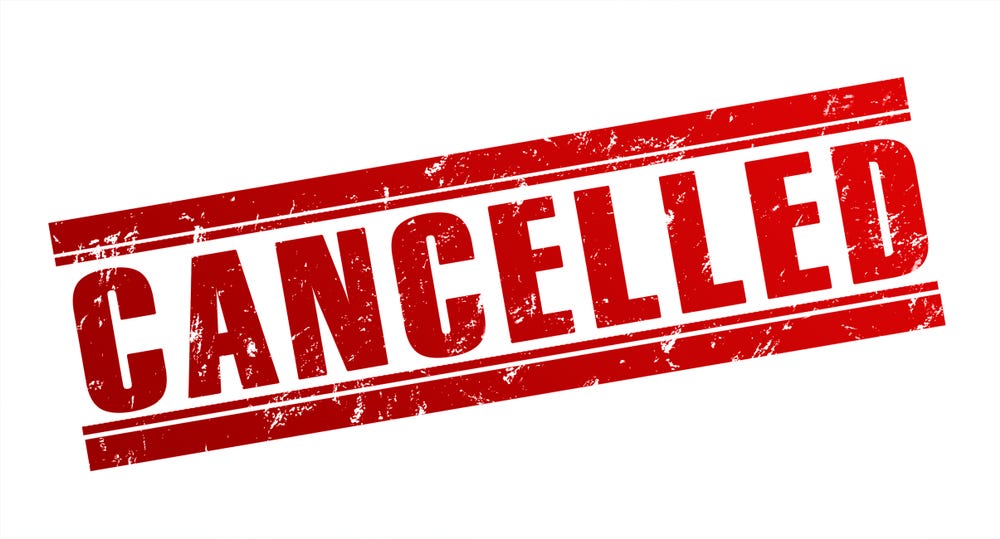E-Pluribus | March 29, 2022
'Dark money' *is* free speech, who should really be cancelled, and the new face of book banning.
A round up of the latest and best writing and musings on the rise of illiberalism in the public discourse:
Alex Baiocco: When They Attack 'Dark Money,' They're Really Attacking Free Speech
Nothing seems to bring out accusations of the nefarious nature of “dark money” quite like the confirmation of Supreme Court justices. Alex Baiocco at Reason says Republicans should stop imitating Democrats and recognize the risks to free speech they are encouraging. (Notably, as Baiocco mentions, even the ACLU is raising the alarm on this issue.)
Under the DISCLOSE Act, however, a "campaign-related disbursement" would include "a Federal judicial nomination communication," which is defined as any paid communication effort "that is susceptible to no reasonable interpretation other than promoting, supporting, attacking, or opposing the nomination or Senate confirmation of an individual as a Federal judge or justice." Such communications "shall be treated as campaign-related disbursement[s] regardless of the intent of the person making the disbursement."
In plain English, the bill would transform speech about nominations into a regulated form of campaign speech, even if neither a candidate for office nor an election is mentioned. Organizations that trigger the "judicial nomination communication" regulations would have to submit donor lists to the Federal Election Commission, even though judicial nominations and confirmation processes are not elections.
These invasive and misleading disclosure mandates would thrust the judicial nomination process even further into the realm of partisan politics. Organizations that have always maintained a nonpartisan position and have never participated in elections would likely be unwilling to engage in speech that may trigger the bill's provisions. Nonprofits could fall silent because they prioritize their supporters' privacy over their ability to call on lawmakers to support or oppose a nomination.
Partisan campaign groups won't be scared away. They may be the only ones still willing to speak about nominees besides politicians and major media outlets, because they are already legally obligated to expose their donors and comply with other reporting requirements.
Read it all.
Dan McLaughlin: Cancel Only the Cancelers
At National Review, Dan McLaughlin takes an in depth look at current threats to free speech, citing three main sources: government censorship and interference, private censorship, and censoriousness. Since efforts to fight these threats sometimes venture into dangerous territory themselves, McLaughlin focuses on what true proportionate consequences look like and how all parties in speech disputes can be held accountable without violating the letter or the spirit of the Constitution.
The core of freedom of speech is allowing encounters between willing speakers and willing listeners, with the goal of advancing the truth through an adversarial process of dispute and reflection rather than by restricting ideas deemed too dangerous to discuss. Whether we are discussing the legal right to speech or the broader cultural value, much of the confusion (often deliberate) over free speech revolves around the failure to acknowledge the dual roles of the willing speaker and the willing listener. Your right to speak does not include a right to compel others to listen to you, a right to compel others to affirm or repeat your message, or a right to prevent other people from listening to speakers you reject.
As a private citizen or a private organization, you have a right not to be forced to offer a private platform to speech you would not endorse. We all benefit from liberal norms of free speech that promote a large, public marketplace of ideas. A liberal society, however, must make space for individuals and organizations to act illiberally in order to control their own message. A church can expel unbelievers; a political party or an ideological publication or group can demand adherence to its principles. Those organizations acting in an illiberal manner internally can help them promote an external message that competes in the marketplace of ideas. It helps them become willing speakers available to willing listeners.
[ . . . ]
Mobs will continue to suppress speech unless and until they face consequences. The cancelers and the mobs should be the ones on the receiving end of their own medicine — they ought to be the only ones. A recent New Yorker article about the birth of Method acting tells the story of how the great director Elia Kazan made up his mind in 1952 to “name names” of fellow members of his onetime theater company Communist cell to the House Un-American Activities Committee. Kazan knew that the people he was naming would be canceled in the McCarthy-era sense, blacklisted from working in Hollywood or many other corners of show business. But then, Kazan recalled, these same people had been all too eager cancelers themselves, to the point of firing Kazan himself for departing from the Party line. “In 1936, the Party had ordered the Group’s cell to seize control of the company. When Kazan refused, he was publicly shamed and kicked out[.]”
Read the whole thing.
Kat Rosenfield: The Many Faces of Literary Censorship
“Censorship” and “book banning” often evoke images of self-righteous, right wing, religious zealots intent on making sure no one sees or reads anything they find offensive. While Kat Rosenfield doesn’t find this stereotype completely inaccurate, she writes at Persuasion that the Left has developed its own methods for suppressing literature that offends its own sensibilities, and the impact can be uniquely insidious on artistic creativity and the publishing industry as a whole.
[W]here the quest to suppress objectionable reading material in America used to be more or less the exclusive purview of political conservatives and the religious right, today's censorship flaps are more diverse in both origin and execution. Those freedom-to-read liberals are also, increasingly, enthusiastic censors themselves—ones whose cultural influence is both greater and more insidious than their right-wing counterparts. Conservatives continue to flail about, trying to pull individual books from individual reading lists; but the left has increasingly captured the culture, the means of production, even the creative process.
This shift has been observable over the past two decades, as objections to controversial books began to creep into the discourse from the left. The American Library Association's yearly list of high-profile book challenges paints a picture of a culture in flux.
[ . . . ]
This new wrinkle on the old culture wars has its origins in young adult (YA) publishing, where it was easier to demand content restrictions for the sake of young, vulnerable, impressionable readers, and where fierce social pressure from within the community was often enough to persuade authors to censor themselves. What began in 2014 as a well-intentioned movement to improve diversity in white-dominated YA morphed over the next several years into a culture of callouts, shaming, and cancellation campaigns that often served as a trojan horse for professional jealousy or personal grudges.
Eventually, targeted authors began canceling their own books rather than face the wrath of the community, while others embraced intrusive editorial mores in an attempt to ward off accusations of being problematic—and of course, an unknowable number simply decided that writing wasn't worth the risk, period. And today, adult publishing has begun to embrace many of the same measures and attitudes that first incubated within YA: sensitivity reads, morality clauses, a stay-in-your-lane ethos that forbids writers from imagining the interior lives of characters who don't share their identity markers.
Read it all here.
Around Twitter
Excerpts of a thread by Nicholas A. Christakis regarding a statement by the dean of Yale Law has about the student “protest” of a Federal Society panel earlier in March:
Via Ayaan Hirsi Ali, member of British Parliament Kemi Badenoch speaks on “critical race theory” and education:
And finally, this doesn’t have much to do with illiberalism (other than that North Korea is a very illiberal country!), but it’s totally worth the slight detour from our core Pluribus mission:










kim jung-whoever deserves the oscar for best performance by a mostly irrelevant dictator